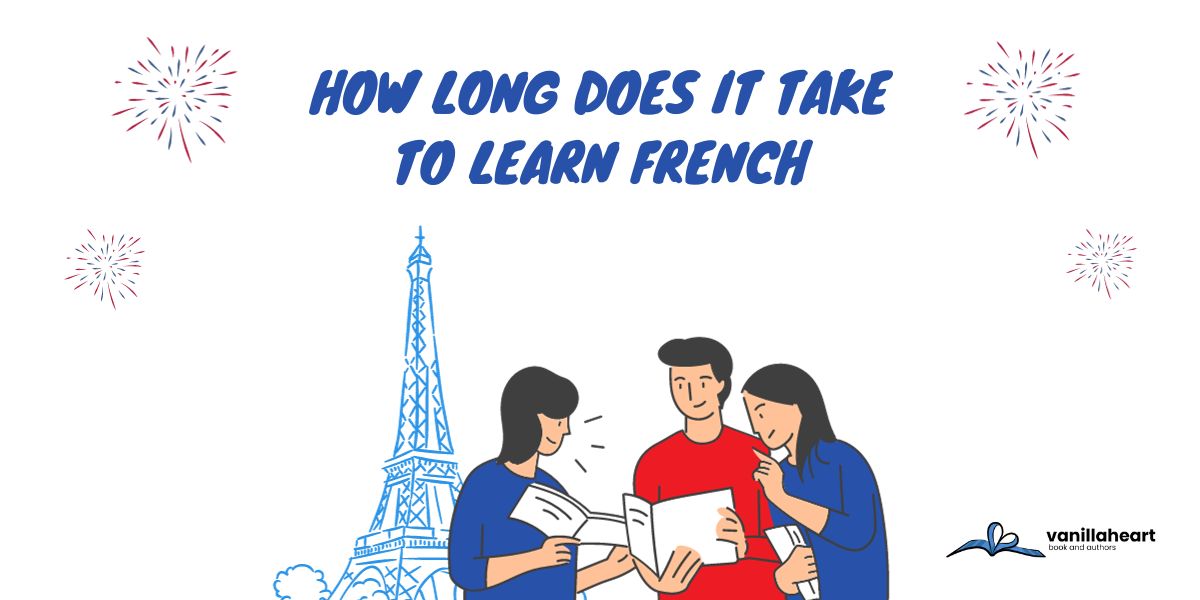
Learning Language
Different people take different amounts of time to learn French. There are, however, some rough figures and helpful tips that can speed up the process.
Estimates say that it takes about 90 hours of study to learn enough French to get by. This is about 30 minutes a day for six months, on average. This is just a rough guess, and your experience may be different. Some people can learn French quickly, while others may take a long time.
Let’s discuss how long does it take to learn French and how hard is French to learn in this blog below and set reasonable goals for your learning process. Find the best ways to learn French quickly and ensure you can speak the language as soon as possible.
How Long Does It Take to Learn French
| CEFR Level | Description | Study Hours Required |
|---|---|---|
| A1 | Basic Conversational Skills: Simple greetings and expressions | 80–100 hours |
| A2 | Everyday Tasks and Conversations: Understanding common phrases | 100–120 hours |
| B1 | Intermediate Proficiency: Ability to make longer sentences | 150–180 hours |
| B2 | Advanced Understanding: Grasping complex texts and discussions | 200–250 hours |
| C1 | Proficient Communication: Fluent conversations in various settings | 250–300 hours |
| C2 | Native Speaker Level: Mastery of language nuances and idiomatic phrases | 300-500 hours |
Learning The French Level According To CEFR
(CEFR) stands for The Common European Framework of Reference, which is a set of rules for judging how well someone speaks a language. This system divides the ability to speak a foreign language into six levels, from A1 (beginner) to C2 (mastery).
CEFR also lists the skills and powers that each level needs. For example, at the A1 level, you should be able to understand and use very basic expressions linked to areas of immediate need. At the C1 level, you should be able to fully express yourself about complex topics, including specialized subjects such as best presidential biographies.
As you move up to higher levels, you’ll be able to understand more complicated phrases and have more in-depth talks. You will also become better at reading and writing in French. But CEFR says that each level needs a lot of study hours. Let’s see how many.
A1 Level
A person learning French at the A1 level should be able to have simple conversations, know how to say hello and goodbye, ask and answer simple questions and know how basic language works.
On this level, talking to other people is very easy. Most of the time, you just say “Hello” and “Goodbye.”
To reach this level, a person needs to study for about 80–100 hours.
A2 Level
When a learner of French gets to the A2 level, they should be able to understand sentences and commonly used phrases that have to do with everyday jobs.
You should also be able to talk about simple, everyday things that involve a direct exchange of information on familiar topics, like housework, ordering food, asking for directions, or talking about simple work-related things.
To get to this level, you must study for another 100–120 hours, 180–200 hours.
B1 Level
At the next level, B1, things start to get interesting. When you’ve reached this level in French, you can make long sentences and talk clearly about many everyday things.
This should make it easier for you to travel to French-speaking countries and help you understand what important people think and let you reply.
This level will take an additional 150–180 hours of study, bringing the total to 350–400 hours.
B2 Level
At the B2 level, a learner can understand the main ideas of complex text about concrete and abstract topics and technical discussions in certain specialized areas. You should also be able to talk to native speakers with enough ease and spontaneity that it doesn’t make either of you feel uncomfortable.
Regarding how long does it take to learn French B2, the total number of hours you’ll need to learn is 600–650. To get to B2, you’ll need to study for an extra 200–250 hours.
C1 Level
At the C1 level, your French is good enough to talk freely, without much trouble, and without looking for words too often. You should also be able to use the language in a social, academic, or business setting flexibly and effectively.
You should also be well-versed in French culture and conversant enough in French to have a meaningful conversation with a local.
Regarding how long does it take to learn French o get here, you need to study for an extra 250–300 hours. According to CEFR rules, you need to study French for 850–900 hours to become proficient.
C2 Level
At the top level, C2, you can speak the language as well as a native speaker. You should understand almost everything you read or hear at this level. You should also be able to use idiomatic phrases and other small but important parts of the language.
If you want to get to C2, you’ll need to put in some work. However, the number of hours you need to learn can vary. We don’t know the exact time on how long does it take to learn French.
Tips to Learn French Faster
There is no clear answer to how does long it take to learn French. But this doesn’t mean that there isn’t something you can do to help yourself learn faster.
Based on what we’ve talked about so far, here are five helpful tips to make sure you can speak French as quickly as possible.
1- Choose the right method.
There are many ways to learn French, and not all of them work well for everyone. You need to find a way that works for you, and you enjoy it. You might have to try a few things before finding one that sticks. This will help you stay focused and get the best results in the shortest amount of time.
2- Set achievable goals.
When you’re just starting out, giving yourself reasonable goals is important. Don’t try to learn everything in one day. Start with simple sentences and grammar rules, and then add to what you know over time.
3- Keep practicing.
If you want to learn a language quickly, you must make it a habit. Even if you only do it for 10 or 15 minutes a day, if you do it every day, you will see benefits over time.
4- Make a helpful setting.
If you want to learn French, it helps to listen to and read as much French as you can. You should listen to French songs and podcasts, watch French TV shows and films, and read French books and articles. This is not only useful but also fun.
5- Find a study partner or a teacher.
As we’ve discussed before, one of the benefits of taking a class is getting help with your homework. But even if you’re learning independently, you can still find a teacher or English to French Book Translation Services to practice with regularly.
What Affects the Learning French Process?
As you can see, it takes a lot of time and work to get good at French, more than 900 hours in total, according to CEFR standards.
But these are just estimates. In truth, how long does it take to learn French will depend on several things. Let’s take a look at them.
How To Start Learning French Language?
Your starting point is the most important thing. If you already know some French at the A1 level, it will be easy for you to move on to the next level. You should be able to understand up to 30% of the language right away.
If French is your first foreign language, on the other hand, the job might seem more difficult.
Many people also say it matters how good you are at learning new things. You should expect to learn French more rapidly than someone who takes their time grasping new concepts.
But you won’t know how well you can learn French until you do it. And even then, even people who are good at language can face problems.
Time and Regularity of the Studies
Next, consider how much time you have to devote to studying French. You will learn more quickly if you can devote several hours per day to studying rather than just a few minutes.
It’s also important to keep studying every day. If you study for a few hours one day and then stop for a week or even a month, it will take you longer to how long does it take to learn French and get good at the language. If you want to learn quickly, you need to make it a habit to learn every day.
But don’t worry. You don’t have to learn something new every day. Set up a plan that works for you. Taking lessons twice or three times a week can help if you do it often.
Conclusion
The length of your journey towards French fluency relies on many factors, including your starting point, the amount of time and effort you put into learning the language, and the study methods you choose. If you follow the CEFR rules, you can make reasonable progress from A1 through C2.
Using efficient strategies like regular practicing, listening to French media, finding a study partner, and setting attainable goals will help you learn French more quickly. The greatest way to learn a new language is the best way for you, so experiment until you find something that clicks.


